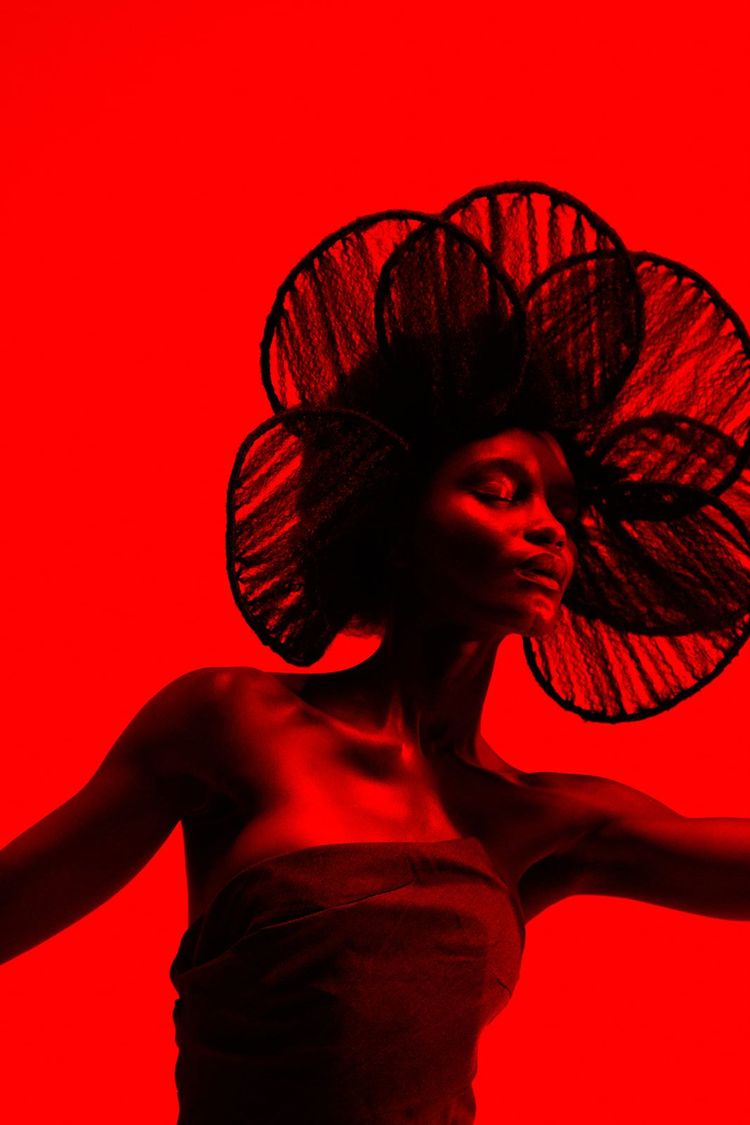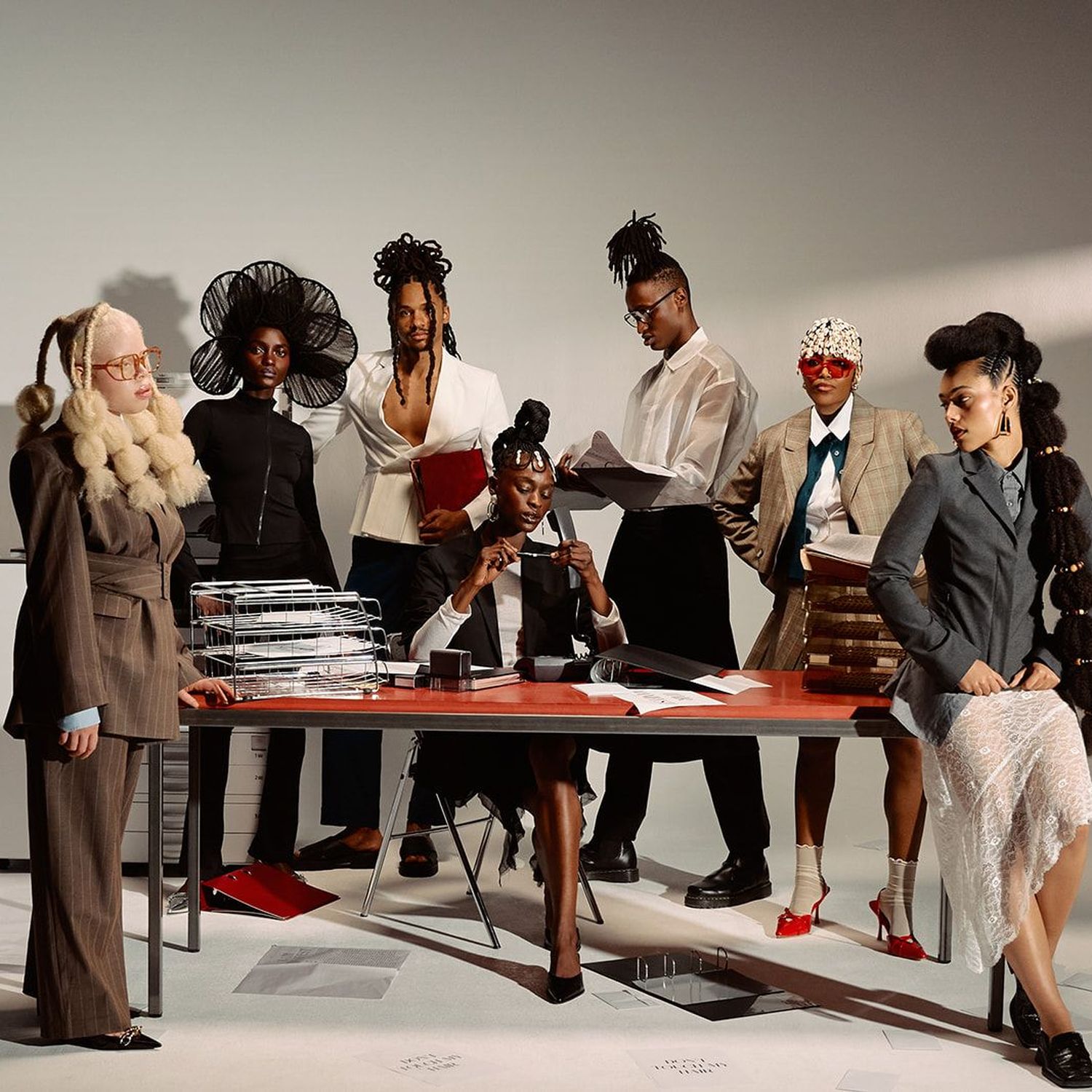Photographer Anne-Sophie Benoit’s Don’t Touch My Hair is a powerful visual statement on the silent resistance against Western beauty standards that sideline Afro-textured hair. Labeled “unprofessional” or “untamed,” natural hair is often policed, forcing many to conform to avoid discrimination. Here, Benoit pens a personal, photographic ode that confronts the deeper reality of identity, acceptance, and the unspoken sacrifices made in professional spaces
Can you start by introducing 'Don’t Touch My Hair'? What drew you to tell this story through photography?
"Don’t Touch My Hair is a project that sheds light on the discrimination against Afro-textured hair in Western societies, in particular in the workplace. It tells a story of silent resistance to beauty standards that subtly yet brutally exclude Afro hair in our societies, forcing many to conform by straightening their hair or wearing wigs to avoid being judged as "unruly" or "unprofessional". Don't Touch My Hair can be read as a personal plea—"don’t touch our hair"—but also as a broader call for society to respect and embrace the ways we choose to express our identity. It is a call to honour boundaries and celebrate diversity.
As a beauty and fashion photographer, I wanted to use fashion’s aesthetic codes to convey a deeper societal message. I believe that aesthetics can serve a purpose. In an era shaped by visuals, photography becomes a tool for expression, amplifying social realities and reaching wider audiences."
The series explores beauty standards and their impact on Afro-textured hair. What inspired you to tackle this subject, and how personal did it feel to create?
"Since I was a child, and as an Afro-descendant woman, I have always had a complicated relationship with my hair, shaped by a lack of representation and a pressure to conform. Growing up as one of the only people of color in school, I felt disconnected, seeing straight hair dominate the beauty standards reflected in media and my environment. Even during my time in Africa, where I lived between Benin and Gabon, European ideals influenced beauty norms, with Black women around me, including my mother, relaxing their hair or wearing wigs and weaves.

Photo: Anne-Sophie Benoit

Photo: Anne-Sophie Benoit

Photo: Anne-Sophie Benoit
It wasn’t until high school that I encountered the "nappy" movement, which sparked a journey of self-reflection. In 2015, I cut my hair to let it go back to its natural state, but this decision came with negative reactions, judgmental stares, random people touching my hair without my consent, and even professional criticism, such as being told by my manager that my hair wasn’t “professional.”
I could finally contribute to the representation I lacked as a child. Giving a voice to this issue is incredibly meaningful to me, as I hope it will resonate with people who had the same experience
Anne-Sophie Benoit
Realising that these struggles were not unique to me but part of a global issue, I delved into researching hair discrimination and its impact. As I grew up in my artist life, I felt a responsibility to speak out on societal issues. On the day of the photoshoot and throughout the creative process, I felt deeply moved because I could finally contribute to the representation I lacked as a child. Giving a voice to this issue is incredibly meaningful to me, as I hope it will resonate with people who had the same experience."

Photo: Anne-Sophie Benoit

Photo: Anne-Sophie Benoit

Photo: Anne-Sophie Benoit
Could you tell us more about your creative process? How did you go about capturing the strength and vulnerability woven into this story?
"For this project, I began by exploring the issue of hair discrimination through documentaries, conferences, exhibitions, and other mediums to deepen my understanding and refine my vision. Although the idea had been with me for years, 2024 felt like the right moment to bring it to life as I deeply questioned my own identity. My goal was to translate societal conversations into powerful images, using the workplace — an environment where forced conformity is particularly obvious — as a central theme. Drawing inspiration from the aesthetics of the office ("office core"), I staged hair as a symbol of self-expression and identity reclamation, envisioning a group of people in an office setting, plotting a revolution through their hair!
The project also reflects contemporary efforts to address hair discrimination, such as influencer Kenza Bel Kenadil’s involvement in signing a legislative proposal at the French National Assembly in March 2024 aimed at reducing hair discrimination in the workplace.

Photo: Anne-Sophie Benoit

Photo: Anne-Sophie Benoit

Photo: Anne-Sophie Benoit
Combining traditional and modern hairstyles, the images highlight both historical significance and modern-day self-affirmation
Anne-Sophie Benoit
Combining traditional and modern hairstyles, the images highlight both historical significance and modern-day self-affirmation. These hairstyles empower the individuals wearing them, celebrating their resilience and identity. In the quieter portraits, vulnerability becomes a quiet force, revealing the strength of those who fight, often silently, for acceptance and the freedom to be themselves. Through this work, I hope to raise awareness and inspire change in how society perceives and respects natural hair."
Hair discrimination is at the heart of the conversation in 'Don’t Touch My Hair'. How do you see this series contributing to the broader dialogue around acceptance and identity?
"My goal is to change mindsets so that people of colour can freely express their identities in society without facing judgment or discrimination. I want to empower those affected to confidently say, "This is who I am," while fostering societal change that promotes acceptance for all. Many people are unaware of the struggles surrounding identity and the challenges faced by people of colour, which is why it's crucial to raise awareness and highlight how central identity is in our society. We all have a role to play, whether as allies or activists, in ensuring everyone feels safe and accepted for who they are.
Having worked in the beauty and fashion industry, I've witnessed firsthand the inequities that persist, such as models’ hair being damaged due to lack of proper care or makeup that doesn't match their skin tones.

Photo: Anne-Sophie Benoit

Photo: Anne-Sophie Benoit

Photo: Anne-Sophie Benoit
These issues affect not just Afro-descendant people but many others who face discrimination. Through this project, I want to open people’s eyes to hair discrimination. But I also want it to be more than just that—I want it to serve as a stepping stone to initiate deeper conversations about all kinds of discrimination. My hope is to spark dialogue, encourage people to seek out information, spread awareness, and ultimately become part of the change."
What’s been the most surprising or meaningful feedback you’ve received about the project so far?
"What has touched me the most is to see how universal this project is. It’s not just a French issue, or a European issue, it’s happening worldwide.
I’ve also been so touched and so grateful with all the people who choose to be part of this project. Bringing more than 20 people to this set felt overwhelmingly beautiful. It does take a village to make bigger things, and I’m so lucky to have found people who believed in this project as much as I did."
PHOTOGRAPHER/AD: Anne-Sophie Benoit
MAKE-UP: Emmanuelle Damais & Cidji Humbert
HAIR: Anne-Cécile Tubanza & Cindy Romain
MAKE-UP ASSISTANT: Inès Nouri
SET DESIGNER: Lina Kouhaili
STYLIST: Anaïs Gillot
STYLIST ASSISTANT: Laura Pasquiet
MOVEMENT DIRECTOR: Laëtitia Daché
DIRECTOR: Alvaro Leonel Castro
DOP: Thibault Menu
PHOTO ASSISTANT: Alessandro Ferraioli
PRODUCTION ASSISTANT: Quentin Ritz
BTS PHOTOGRAPHER: Josefine Lindhardt
STUDIO: Maria studio Paris
MODELS :
Reine-Herminione Etalle, Maguette Soukouna & Apie Yapo - New wave management
Evelina Gomes - Revolt model agency
Imane Legos, Camerone Kante - VIP models Paris
Julien. Kluska - Agence Sarah M.
